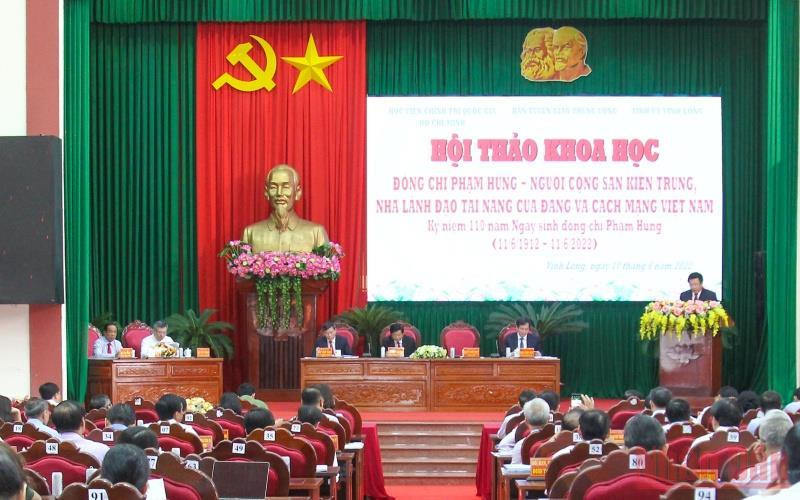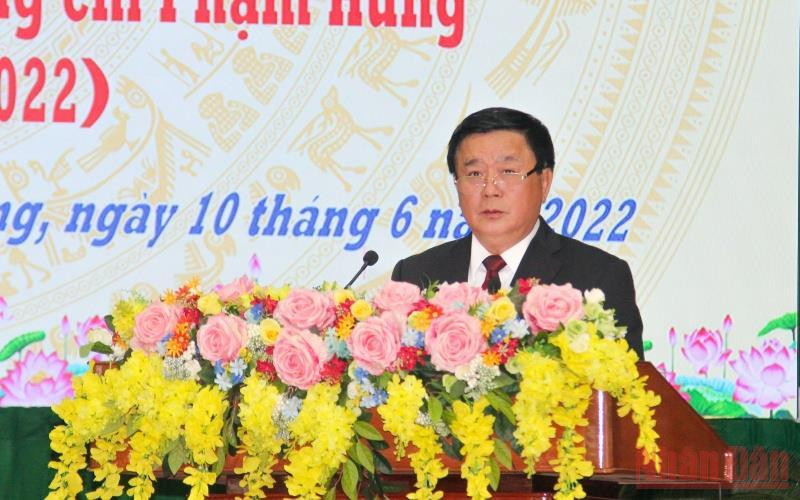Comrade Pham Hung - A staunch communist, a talented leader of the Party and the Vietnamese revolution
On June 10, in Vinh Long province, Ho Chi Minh National Academy of Politics coordinated with the Central Propaganda Department and Vinh Long Provincial Party Committee to organize a scientific workshop "Comrade Pham Hung - A staunch communist, a talented leader of the Party and the Vietnamese revolution".
 |
| Conference scene. Photo: Ba Dung |
Professor, Dr. Nguyen Xuan Thang, Politburo member, Director of Ho Chi Minh National Academy of Politics, Chairman of the Central Council of Theory, attended and chaired the Workshop.
The scientific conference is a practical activity to celebrate the 110th birthday of Comrade Pham Hung (June 11, 1912 - June 11, 2022), former member of the Politburo, Chairman of the Council of Ministers of the Socialist Republic of Vietnam, a staunch communist, a talented leader, an example of a communist who fought and sacrificed his whole life for the revolutionary cause of the Party, for the independence of the nation, freedom and happiness of the people. This is also an opportunity for our cadres, party members and people to continue to express gratitude and honor the great contributions of Comrade Pham Hung to the Vietnamese revolution and his homeland Vinh Long.
Comrade Pham Hung, birth name Pham Van Thien, was born in Long Thieng hamlet, Long Ho village, Binh Long commune, Vinh Binh district, Vinh Long province (now Long Phuoc commune, Long Ho district, Vinh Long province).
In 1930, he was admitted to the Indochinese Communist Party.
In 1931, he was appointed Secretary of My Tho Provincial Party Committee.
In April 1931, he was arrested by the enemy, then imprisoned in a cell with a death sentence in the Big Prison - Saigon, and then exiled to Con Dao prison (January 1, 1934).
The August Revolution of 1945 succeeded, and he was welcomed back to the mainland.
Since 1946, comrade Pham Hung has held many important positions.
In 1956, at the 10th Conference of the 2nd Party Central Committee, he was elected as a member of the Politburo and Head of the Central Unification Committee.
In 1957, he was appointed Minister of the Prime Minister's Office.
In April 1958, at the 8th Session of the 1st National Assembly, he was Deputy Prime Minister of the Government of the Democratic Republic of Vietnam.
In 1967, he was assigned by the Politburo to the Southern battlefield, serving as Secretary of the Central Office for Southern Vietnam and Political Commissar of the Southern Liberation Armed Forces.
In 1975, he was Political Commissar of the historic Ho Chi Minh Campaign Command.
In 1976, at the 4th Party Congress, he continued to be elected as a member of the Politburo, Deputy Prime Minister (from 1981, Vice Chairman of the Council of Ministers).
From 1980 to 1986, he concurrently held the position of Minister of the Interior (now the Ministry of Public Security). At the first session of the 8th National Assembly (June 1987), he was elected Chairman of the Council of Ministers (now the Government) of the Socialist Republic of Vietnam. He was a National Assembly delegate of the 2nd, 3rd, 6th, 7th, and 8th terms.
Comrade Pham Hung died on March 10, 1988, while on a business trip in Ho Chi Minh City.
 |
| Prof. Dr. Nguyen Xuan Thang, Politburo member, Director of the Ho Chi Minh National Academy of Politics, Chairman of the Central Theoretical Council, spoke at the Workshop. Photo: Ba Dung |
Speaking at the workshop, comrade Nguyen Xuan Thang affirmed that comrade Pham Hung, a typical senior leader of the Party, was an excellent student of President Ho Chi Minh. His life and revolutionary career are closely associated with heroic history and great victories of historical significance of the Vietnamese revolution.
Comrade Pham Hung is a talented leader of the Party and the Vietnamese revolution. With his talent, creativity, steadfastness, burning revolutionary enthusiasm, extraordinary courage and determination, and a high sense of responsibility towards the Party and the people, Comrade Pham Hung was trusted by the Party and the State to undertake many important responsibilities. No matter what position he held, no matter how difficult or arduous, he was always ready to stand at the "head of the wave, the wind" to excellently complete his tasks...

